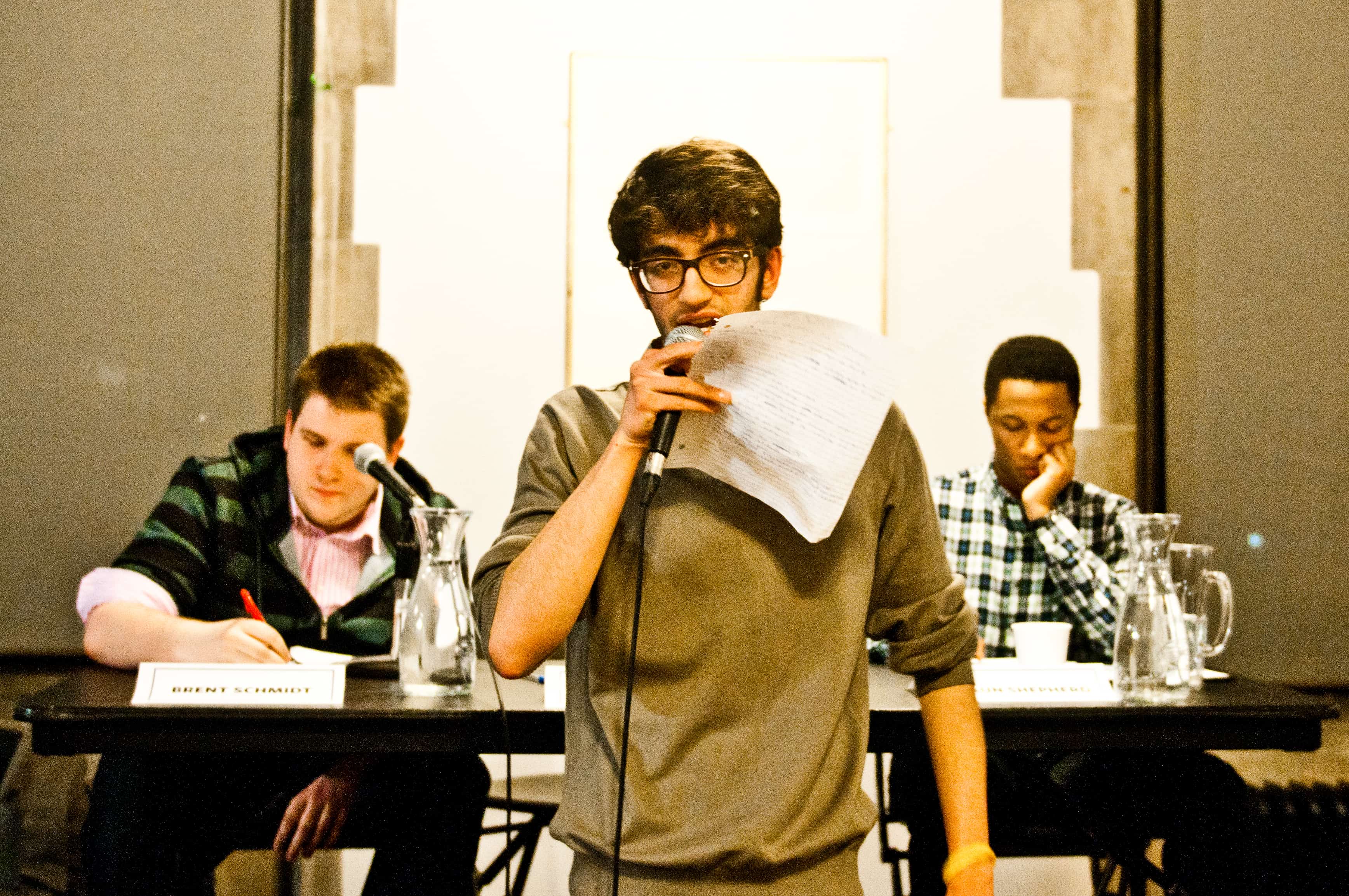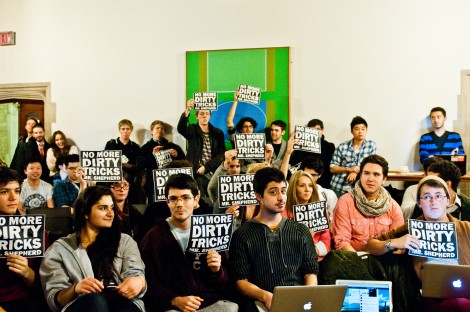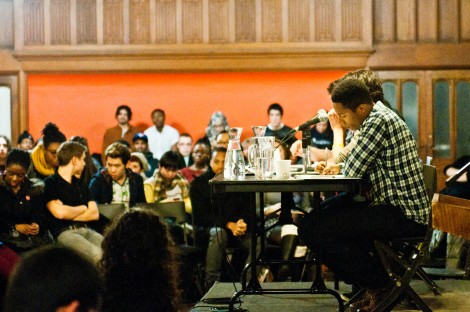Index
Introduction
Hostilities hamper proceedings
Build a bar?
Equity and inclusivity
Drop credit proposal
Clubs funding and budget transparency
Racist undertones
***
Recordings
VP Internal and Services — Dylan Moore (StudentsFirst) vs. Corey Scott (Unity) — 28min
VP External — Alex Ripley (StudentsFirst) vs. Abigail Cudjoe (Unity) — 19min
VP Equity — Karthy Chin (StudentsFirst) vs. Noor Baig (Unity) — 33min
VP University Affairs — Carmen Reilly (StudentsFirst) vs. Munib Sajjad (Unity) — 34min
President — Brent Schmidt (StudentsFirst) vs. Rohail Tanoli (Independent) vs. Shaun Shepherd (Unity) — 96min
***
Shouting matches dominated UTSU’s four-hour all-candidates debate Wednesday night in Hart House, where a large yet divided crowd argued about issues like an undergraduate bar, clubs funding, study space, and budget transparency.
The debate was a face-off between Team Unity, a slate led by current VP external Shaun Shepherd, and StudentsFirst, the first opposition team to qualify for office in two years headed, by Brent Schmidt.
Public notice of the debate wasn’t issued until a day before despite the room being reserved since February 10.
A “wrong version” of an announcement had been sent out and used widely, according to chief returning officer Daniel Lo, resulting in the short notice. Due to this, UTSU decided to live-stream the debate for viewers, Lo added.
A UTSU staffer told The Varsity that the video would remain available for students to watch online but it was quietly removed from the website on Friday with no explanation.
***
Hostilities hamper proceedings
Despite an opening plea for civility from moderator and Multi-Faith Centre director Richard Chambers, the raucous debate and heated rhetoric left many students disappointed. Chambers was forced to expel at least one student from the room.
When Team Unity presidential candidate Shaun Shepherd spoke, some students jeered and held up posters saying “No More Dirty Tricks, Mr. Shepherd.”
CRO Daniel Lo later penalized StudentsFirst over these tactics, although Schmidt had publicly denied his slate’s involvement in the posters’ production and distribution.
Team Unity released a statement the following day, expressing their frustration with the “barrage of yelling, screaming, racist, and Islamophobic attacks” that occurred throughout the evening.
During the debate, independent presidential candidate Rohail Tanoli repeatedly railed against the hostilities on display, calling it a “sad state of affairs.”
***
Build a bar?
StudentsFirst’s proposal to build a campus bar drew numerous questions and comments from both sides.
Shepherd pointed out that U of T already has a number of spaces to drink on campus: Sammy’s, the LLBO-licensed cafe in Hart House, the engineering faculty pub Suds, and the campus bar run by the Graduate Students’ Union. He also listed other watering holes near the St. George campus, such as The Madison, Molly Bloom’s, the Brunswick House, and Ein Stein’s.
Schmidt, however, retorted that the campus lacks an “undergraduate UTSU pub for all students.”
“This is a distinction Shaun fails to make,” said Schmidt. “If he tells me to suck it up and go to these other pubs where alcohol is very expensive, then clearly he’s not taking the issue very seriously.”
The idea encountered harsh criticism, especially when StudentsFirst VP equity candidate Karthy Chin touted the bar as a multi-faith space.
“Can you please explain how a campus bar would fit into a framework of equity?” asked Katharine Ball, president of the Arts & Science Student Union.
Some Muslim students also expressed concern that as non-drinkers, a campus bar was not an inclusive space for them.
But Tanoli, himself a Muslim, came out in support of the bar. He said that the bar could potentially help club fundraising and bolster school spirit.
“York has it. Ryerson has it. Mississauga has it. McGill has it. Why can’t we?” he asked.
***
Equity and inclusivity
Equity, inclusivity, and political leanings were some of the most contested topics during the debate
The VP equity candidates promised to make multi-faith prayer spaces a priority. But Team Unity’s proposal to create a prayer space in Robarts was taken by a vocal group of atheists as an affront, much as the StudentsFirst bar was to Muslim students.
“Do you not recognize that a prayer space is exclusionary to those students who do not pray?” asked a questioner.
“I’m not entirely sure of the relevance of that question,” Baig replied. “Multi-faith prayer spaces are for students who need prayer space.”
The thorny issue of Israeli Apartheid Week (IAW) also came up numerous times.
“I have a bit of a thought experiment for you, Noor,” said one student, directing his question to Baig. “If you were a Jewish student on campus and your student fees were going towards Israeli Apartheid Week, how would you feel and do you think that’s an appropriate role for a student union on campus?”
“I don’t have any comments on how that relates to anti-Semitism,” Baig replied. “But I am opposed to anti-Semitism, and as VP equity, I will fight against it.”
Shepherd was also grilled over IAW.
“Do you personally support IAW on this campus, and the toxic, divisive environment that it creates — yes or no?” asked someone from the audience.
Schmidt and Tanoli both responded with an unequivocal “no,” but Shepherd provided a more evasive response.
He said he would commit only to “listening to student concerns and acting appropriately,” which drew boos from the audience.
Shepherd’s response also earned a sharp rebuke from Schmidt, who called it “indicative of a pattern at the union, where the answer you always get is ‘I will work for it in the future’ or ‘come and talk to me later.’”
***
Drop credit proposal
Munib Sajjad, Team Unity VP university affairs candidate, promised to lobby for “grade forgiveness” if elected. Under his proposed policy, U of T students can strike bad grades from their transcripts.
“We believe students should be given a second chance,” Sajjad said. “That’s what the drop credit policy would be for.”
The university currently allows students to take courses credit/no credit, provided they declare their intention to do so before the course begins. It also maintains a late withdrawal policy that allows students to remove themselves from a class after the drop date and up to six months after the class ends.
StudentsFirst VP university affairs candidate Carmen Reilly appeared receptive to the idea but cautioned that while the policy would provide an initial GPA bump, employers and graduate schools might treat U of T graduates with increased skepticism.
Questioned whether the policy can ever be a reality, Sajjad replied that “it sure is possible.”
“It’s happened at other universities, and it can happen here if we can continue to lobby administrators,” he said, adding that UTM, where he’s currently VP external, is implementing this program.
***
Clubs funding and budget transparency
StudentsFirst candidate for VP internal & services Dylan Moore committed to increasing clubs funding by 50 per cent if elected.
“What we hear from clubs is that they need more funding to host the events that they want to host,” said Moore.
Corey Scott of Team Unity, who is seeking re-election to the same position he currently holds, is running instead on his record.
“I’ve increased clubs training sessions. I’ve increased the amount of clubs funding and the services available to them as well. And we’ve released clubs funding at the earliest date that [it’s] ever been released,” he said.
The two candidates also discussed their stances on budget transparency.
Scott claims that for the first time this year, the union published its budget online, fulfilling a campaign promise he had made previously.
But Moore responded that these steps towards online transparency hadn’t gone far enough.
“As it stands now, there are some problems with students knowing that their money is being spent well,” he said. “Having a sort of black box that says ‘$800,000 on salaries’ isn’t good enough.”
If elected, he promised to publish comprehensive monthly spending reports and hold a full public review of all paid positions in the union.
***
Racist undertones
The divisiveness of the debate, and of the election in general, has left many students concerned about the state of campus politics at U of T. This year’s election was overshadowed by allegations of racism, race-baiting, and inflammatory rhetoric.
StudentsFirst supporter Robert Boissonneault claimed to overhear current UTSU president Danielle Sandhu calling him a “racist.”
Invited to explain her remark, Sandhu stood and responded that Boissonneault had once called her a “terrorist,” which she thought was “pretty racist.”
Most of the room looked on, baffled at the exchange.
A Team Unity Facebook statement released about the debate’s aftermath condemned racist undertones displayed by some students in attendance.
Ironically, students seized on the statement, which was released as a Facebook note, leaving over 80 angry comments.
The gridlock between supporters of the two slates meant that common ground was found in only one place: the independent candidate, Tanoli.
At times, Tanoli appealed openly for some sign of unified approval from the assembled audience.
“I don’t know what I can say to get some clapping from both sides of the room,” he said, appearing exasperated. It was one of the few universally well-received lines of the entire debate.




